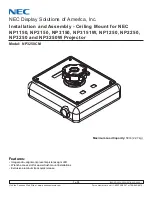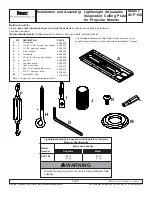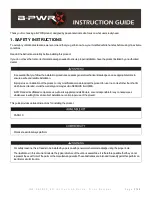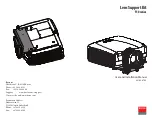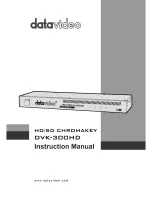
Model FP-524D
FP-524D Instruction Manual
Rev. 1.6
Page 20 of 39
When the status list sequence is complete, the display will revert to the “View Sensor Status” text scroll. The
user can either: 1) review list again by executing another 3-4 second hold, 2) move to another menu item by
executing a momentary hold over PGM1 or PGM2, or 3) return to Normal Operation via automatic timeout of
about 15 seconds (the display will scroll “View Sensor Status” 4 times and then return to Normal Operation).
3.5.2
Set AutoSpan Level
Set AutoSpan Level
is used to set the span gas concentration level that is being used to calibrate the sensor.
This level is adjustable from 5% to 95% of selected full-scale range. The current setting can be viewed in
View Program Status.
The menu item appears as: “
Set AutoSpan Level
”.
From the
Set AutoSpan Level
text scroll, hold the magnet over PGM1 or PGM2 until the “
▼” prompt
appears and continue to hold the magnet in place for an additional 3-4 seconds (until the display starts to scroll
“Set Level”). The display will switch to “XX“(where XX is the current gas level). Swipe the magnet
momentarily over PGM1 to increase or PGM2 to decrease the AutoSpan Level until the correct level is
displayed. When the correct level is achieved, hold the magnet over PGM1 or PGM2 for 3-4 seconds to
accept the new value. The display will scroll “Level Saved”, and revert to “Set AutoSpan Level” text scroll.
Move to another menu item by executing a momentary hold, or return to Normal Operation via automatic
timeout of about 15 seconds (the display will scroll “Set AutoSpan Level” 4 times and then return to Normal
Operation).
3.5.3
Set Gas Factor
Because of the catalytic bead sensor’s almost universal response to combustible gases, the FP-524D sensor can
be configured to specifically detect any of the combustible gases listed in Table 2. This gas is referred to as
the “target gas”. In addition, the sensor can also be configured so that it can be calibrated with any of the
listed gases regardless of which target gas is selected. This gas is referred to as the “cal gas”. These two
features,
Set Gas Factor
and
Set Cal Factor,
allow a significant degree of flexibility in the detection and span
calibration process.
NOTE:
The default value for gas factor is 1.0. This would be used when methane is the target
gas. Values other than 1.0 would be used when the target gas is not methane.
Set Gas Factor
is used to make the appropriate signal sensitivity adjustment when the target gas is a gas other
than methane. This is necessary because the catalytic bead sensor has different signal strengths for each
combustible gas and all reading calculations are made based on a reference to methane. The gas factor value is
adjustable from 0.2 to 5.0. It represents the translation between the target gas and methane gas, where
methane has a normalized gas factor = 1.0. For example, the gas factor for butane is 1.71, because the signal
strength of butane is 1.71 times lower than methane. The current setting can be viewed in View Program
Status – Gas Factor.
The following table shows the gas factors of most combustible gases that can be measured. Find the target gas
and enter the corresponding value as the gas factor. For example, if butane were the target gas, the correct gas
factor would be 1.71. If there is a mixture of target gases, use a weighted approach to determine the correct
gas factor. For example, if the target gas was 50% butane and 50% methane, the correct gas factor would be
calculated and entered as 0.5(1.71) + 0.5 (1.0) = 1.35.
































